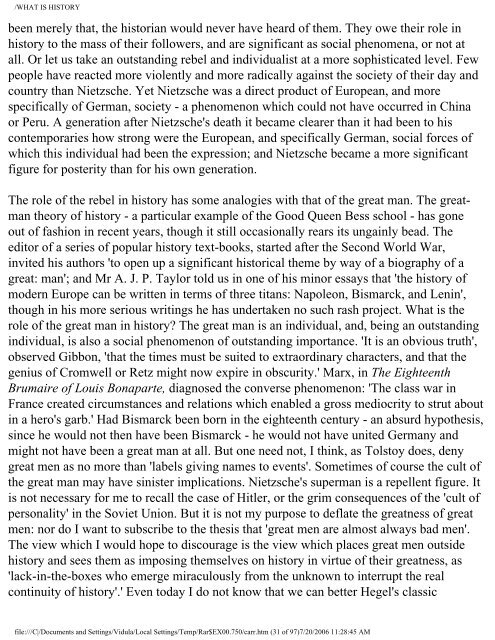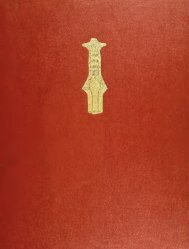What is History / by Edward Hallett Carr - Universal History Library
What is History / by Edward Hallett Carr - Universal History Library
What is History / by Edward Hallett Carr - Universal History Library
You also want an ePaper? Increase the reach of your titles
YUMPU automatically turns print PDFs into web optimized ePapers that Google loves.
WHAT IS HISTORY<br />
been merely that, the h<strong>is</strong>torian would never have heard of them. They owe their role in<br />
h<strong>is</strong>tory to the mass of their followers, and are significant as social phenomena, or not at<br />
all. Or let us take an outstanding rebel and individual<strong>is</strong>t at a more soph<strong>is</strong>ticated level. Few<br />
people have reacted more violently and more radically against the society of their day and<br />
country than Nietzsche. Yet Nietzsche was a direct product of European, and more<br />
specifically of German, society - a phenomenon which could not have occurred in China<br />
or Peru. A generation after Nietzsche's death it became clearer than it had been to h<strong>is</strong><br />
contemporaries how strong were the European, and specifically German, social forces of<br />
which th<strong>is</strong> individual had been the expression; and Nietzsche became a more significant<br />
figure for posterity than for h<strong>is</strong> own generation.<br />
The role of the rebel in h<strong>is</strong>tory has some analogies with that of the great man. The greatman<br />
theory of h<strong>is</strong>tory - a particular example of the Good Queen Bess school - has gone<br />
out of fashion in recent years, though it still occasionally rears its ungainly bead. The<br />
editor of a series of popular h<strong>is</strong>tory text-books, started after the Second World War,<br />
invited h<strong>is</strong> authors 'to open up a significant h<strong>is</strong>torical theme <strong>by</strong> way of a biography of a<br />
great: man'; and Mr A. J. P. Taylor told us in one of h<strong>is</strong> minor essays that 'the h<strong>is</strong>tory of<br />
modern Europe can be written in terms of three titans: Napoleon, B<strong>is</strong>marck, and Lenin',<br />
though in h<strong>is</strong> more serious writings he has undertaken no such rash project. <strong>What</strong> <strong>is</strong> the<br />
role of the great man in h<strong>is</strong>tory? The great man <strong>is</strong> an individual, and, being an outstanding<br />
individual, <strong>is</strong> also a social phenomenon of outstanding importance. 'It <strong>is</strong> an obvious truth',<br />
observed Gibbon, 'that the times must be suited to extraordinary characters, and that the<br />
genius of Cromwell or Retz might now expire in obscurity.' Marx, in The Eighteenth<br />
Brumaire of Lou<strong>is</strong> Bonaparte, diagnosed the converse phenomenon: 'The class war in<br />
France created circumstances and relations which enabled a gross mediocrity to strut about<br />
in a hero's garb.' Had B<strong>is</strong>marck been born in the eighteenth century - an absurd hypothes<strong>is</strong>,<br />
since he would not then have been B<strong>is</strong>marck - he would not have united Germany and<br />
might not have been a great man at all. But one need not, I think, as Tolstoy does, deny<br />
great men as no more than 'labels giving names to events'. Sometimes of course the cult of<br />
the great man may have sin<strong>is</strong>ter implications. Nietzsche's superman <strong>is</strong> a repellent figure. It<br />
<strong>is</strong> not necessary for me to recall the case of Hitler, or the grim consequences of the 'cult of<br />
personality' in the Soviet Union. But it <strong>is</strong> not my purpose to deflate the greatness of great<br />
men: nor do I want to subscribe to the thes<strong>is</strong> that 'great men are almost always bad men'.<br />
The view which I would hope to d<strong>is</strong>courage <strong>is</strong> the view which places great men outside<br />
h<strong>is</strong>tory and sees them as imposing themselves on h<strong>is</strong>tory in virtue of their greatness, as<br />
'lack-in-the-boxes who emerge miraculously from the unknown to interrupt the real<br />
continuity of h<strong>is</strong>tory'.' Even today I do not know that we can better Hegel's classic<br />
file:///C|/Documents and Settings/Vidula/Local Settings/Temp/Rar$EX00.750/carr.htm (31 of 97)7/20/2006 11:28:45 AM







